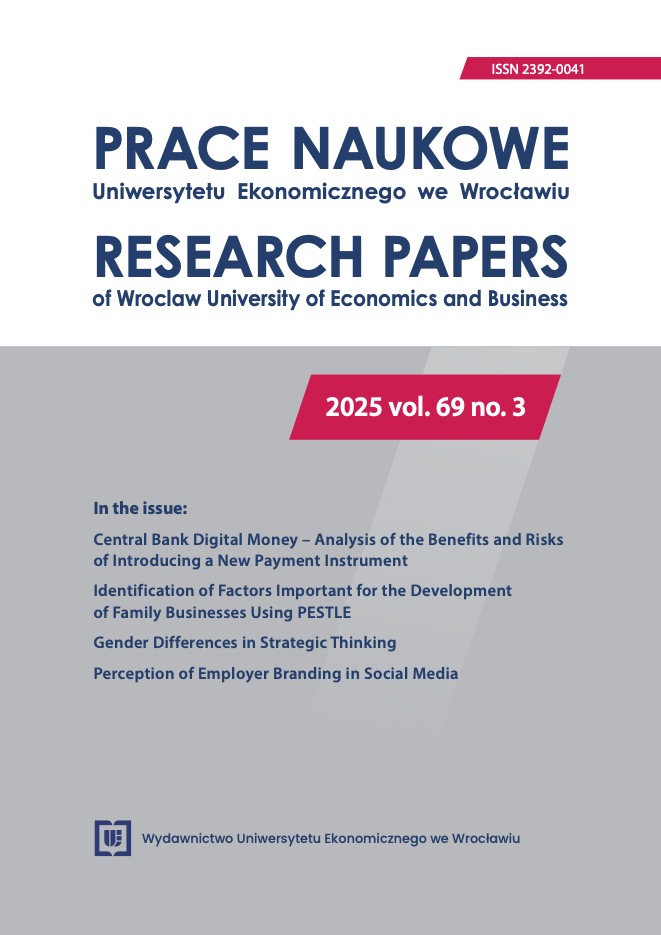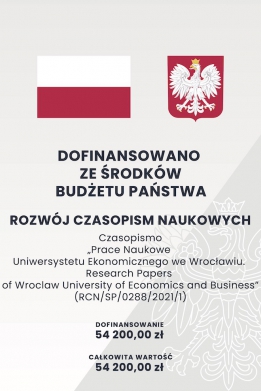Perception of Employer Branding in Social Media – Empirical Study and Implications
DOI:
https://doi.org/10.15611/pn.2025.3.01Keywords:
employer branding, brand management, employer image, social mediaAbstract
Aim: This study examined how often Wrocław university students checked an employer’s online presence before applying, how negative evaluations shaped their intentions, and which social-media activities they considered most attractive (April – June 2021). It responds to intensifying labour-market competition and the need for early, effective communication with potential employees.
Methodology: A diagnostic survey of purposively selected Bachelor’s and Master’s students recruited via social platforms, complemented by a literature review on employer branding as both a theoretical concept and an empirical phenomenon.
Results: Most respondents reviewed a company’s online activity prior to applying, and negative reviews strongly discouraged applications. The analysis identified the employer-branding activities perceived as most effective for young jobseekers; notably, humorous content attracted high interest, underscoring the value of informal communication in building employer–candidate relationships.
Implications and recommendations: The findings can help organisations align employer-branding strategies with the expectations of students in Wrocław and increase recruitment efficiency. Investing early in internships and initiatives that support professional development is advised, along with attentive, transparent online communication.
Originality/value: By focusing on individuals just entering the labour market, the paper offers a fresh perspective on effective employer branding amid demographic decline and provides practical insights for human resource management.
Downloads
References
Aggerholm, H. K., Andersen, S. E., Thomsen, C. (2011). Conceptualising Employer Branding in Sustainable Organisations. Corporate Communications: An International Journal, 16(2), 105-123. https://doi.org/10.1108/13563281111141642
Ambatkar, A. (2021). Employer Branding Through Social Networking Sites. International Journal of Biology, Pharmacy and Allied Sciences, 10(9). https://doi.org/10.31032/IJBPAS/2021/10.9.1017
Ambler, T., & Barrow, S. (1996). The Employer Brand. Journal of Brand Management, 4(3), 185-206. https://doi.org/10.1057/BM.1996.42
Auriemmo, A., Islam, S., Auriemmo, J., & Mazzola, J. (2018). Employer and Customer Branding: An Essential Linkage Leveraged Through Social Media. Journal of Management and Innovation, 4(1). https://jmi.mercy.edu/index.php/JMI/article/view/56
Backhaus, K., & Tikoo, S. (2004). Conceptualizing and Researching Employer Branding. Career Development International, 9(5), 501-517. https://doi.org/10.1108/13620430410550754
Balmer, J. M. T., & Gray, E. R. (2003). Corporate Brands: What Are They? What of Them? European Journal of Marketing, 37(7-8), 972-997. https://doi.org/10.1108/03090560310477627
Bejtkovský, J. (2018). Factors Influencing the Job Search and Job Selection in Students of Generation Y in the Czech Republic in the Employer Branding Context. Management and Marketing, 13(3), 1133-1149. https://doi.org/10.2478/MMCKS-2018-0028
Bharadwaj, S. (2024). How the Interplay of Social Media Usage and Online Reviews Generate Intention to Apply for a Job Vacancy: An Employer Branding-Based Agenda. Management Research Review, 47(3), 441-463. https://doi.org/10.1108/MRR-05-2022-0365
Bjerke, M. B., & Renger, R. (2017). Being Smart about Writing SMART Objectives. Evaluation and Program Planning, 61, 125-127. https://doi.org/10.1016/J.EVALPROGPLAN.2016.12.009
Brubaker, P. J., Church, S. H., Hansen, J., Pelham, S., & Ostler, A. (2018). One Does not Simply Meme about Organisations: Exploring the Content Creation Strategies of User-Generated Memes on Imgur. Public Relations Review, 44(5), 741-751. https://doi.org/10.1016/J.PUBREV.2018.06.004
Cable, D. M., & Turban, D. B. (2003). The Value of Organizational Reputation in the Recruitment Context: A Brand-Equity Perspective. Journal of Applied Social Psychology, 33(11), 2244-2266. https://doi.org/10.1111/J.1559-1816.2003.TB01883.X
Chambers, E. G., Foulon, M., Handfield-Jones, H., Hankin, S. M., & Michaels III, E. G. (1998). The War for Talent. The McKinsey Quarterly, 3(3), 44-57. https://www.researchgate.net/publication/284689712_The_War_for_Talent
Chhabra, N. L., & Sharma, S. (2014). Employer Branding: Strategy for Improving Employer Attractiveness. International Journal of Organizational Analysis, 22(1), 48-60. https://doi.org/10.1108/IJOA-09-2011-0513/FULL/PDF
Dreher, S. (2014). Social Media and the World of Work a Strategic Approach to Employees’ Participation in Social Media. Corporate Communications, 19(4), 344-356. https://doi.org/10.1108/CCIJ-10-2013-0087
Durst, C., & Klopf, V. (2024). Unveiling the Influence: Corporate Influencers and Employer Branding in the Skilled Trades Industry. Proceedings of the 11th European Conference on Social Media – ECSM 2024, 11(1), 92-102. https://doi.org/10.34190/ECSM.11.1.2137
Eisend, M. (2009). A Meta-Analysis of Humor in Advertising. Journal of the Academy of Marketing Science, 37(2), 191-203. https://doi.org/10.1007/S11747-008-0096-Y
Fournier, S. (1998). Consumers and Their Brands: Developing Relationship Theory in Consumer Research. Journal of Consumer Research, 24(4), 343-373. https://doi.org/10.1086/209515
Fu, M., Fraser, B., & Arcodia, C. (2024). Digital Natives on the Rise: A Systematic Literature Review on Generation Z’s Engagement with RAISA Technologies in Hospitality Services. International Journal of Hospitality Management, 122, 103885. https://doi.org/10.1016/J.IJHM.2024.103885
Gilani, H., & Cunningham, L. (2017). Employer Branding and Its Influence on Employee Retention: A Literature Review. The Marketing Review, 17(2), 239-256. https://doi.org/10.1362/146934717X14909733966209
Golden, R. (2025). Employers are Ditching Remote Work. Experts Worry That’s Shortsighted. HR Dive. https://www.hrdive.com/news/employers-ditch-remote-work-experts-worry-shortsighted-move/748261/
Gryko, A. (2024). Work Models as an Element of the Employer Brand in the Polish Labour Market. Scientific Journal of Bielsko-Biala School of Finance and Law, 28(4). https://doi.org/10.19192/WSFIP.SJ4.2024.3
GUS. (2024). Województwo dolnośląskie w liczbach 2024. https://wroclaw.stat.gov.pl/publikacje-i-foldery/foldery/wojewodztwo-dolnoslaskie-w-liczbach-2024-folder,2,6.html
Heimann, C. H. (2024). Employer Branding on TikTok: A Qualitative Study on Attracting Generation Z in the Job Market. University of Twente. Retrieved from https://purl.utwente.nl/essays/100519
Holum, M., Lewicka, D., Opstad, L., & Zając, P. (2024). Career Preferences of Business Students in Norway and Poland: Factors Explaining the Choice between Public and Private Sector. The International Journal of Management Education, 22(3), 100997. https://doi.org/10.1016/J.IJME.2024.100997
Hosain, M. S. (2023). Integration of Social Media into HRM Practices: a Bibliometric Overview. PSU Research Review, 7(1), 51-72. https://doi.org/10.1108/PRR-12-2020-0039/FULL/PDF
Kissel, P., & Buttgen, M. (2015). Using Social Media to Communicate Employer Brand Identity: The Impact on Corporate Image and Employer Attractiveness. Journal of Brand Management, 22(9), 755-777. https://doi.org/10.1057/BM.2015.42
Kuźmińska-Haberla, A. (2024). Business Environment Institutions in Creating the Wrocław Startup Ecosystem. Zeszyty Naukowe Politechniki Śląskiej. Organizacja i Zarządzanie, (192). https://doi.org/10.29119/1641-3466.2024.192.43
Martin, G. (2007). Employer Branding – Time for Some Long and ’Hard’ Reflections? Branding. The Latest Fad or the Future for HR? SILO of research documents. Retrieved from https://silo.tips/download/employer branding-the-latest-fad-or-the-future-for-hr
Mičík, M., & Mičudová, K. (2018). Employer Brand Building: Using Social Media and Career Websites to Attract Generation Y. Economics and Sociology, 11(3), 171-189. https://doi.org/10.14254/2071-789x.2018/11-3/11
Morgan, J. A., & Chapman, D. S. (2024). Examining the Characteristics and Effectiveness of Online Employee Reviews. Computers in Human Behavior Reports, 16, 100471. https://doi.org/10.1016/J.CHBR.2024.100471
Moroko, L., & Uncles, M. D. (2008). Characteristics of Successful Employer Brands. Journal of Brand Management, 16(3), 160-175. https://doi.org/10.1057/BM.2008.4
Mostafa, B. A. (2022). Leveraging Workforce Insights to Enhance Employer Attractiveness for Young Job Seekers During the Pandemic Era. Heliyon, 8(6), e09699. https://doi.org/10.1016/J.HELIYON.2022.E09699
Oikarinen, E. L., & Söderlund, M. (2016). The Effects of Humour in Online Recruitment Advertising. Australasian Marketing Journal (AMJ), 24(3), 180-186. https://doi.org/10.1016/J.AUSMJ.2016.02.005
Ozcelik, G. (2015). Engagement and Retention of the Millennial Generation in the Workplace through Internal Branding. International Journal of Business and Management, 10(3). https://doi.org/10.5539/IJBM.V10N3P99
Papadopoulou, C., Vardarsuyu, M., & Oghazi, P. (2023). Examining the Relationships between Brand Authenticity, Perceived Value, and Brand Forgiveness: The Role of Cross-Cultural Happiness. Journal of Business Research, 167, 114154. https://doi.org/10.1016/J.JBUSRES.2023.114154
Rathee, S., Masters, T. M., & Yu-Buck, G. F. (2022). So Fun! How Fun Brand Names Affect Forgiveness of Hedonic and Utilitarian Products. Journal of Business Research, 139, 44-55. https://doi.org/10.1016/J.JBUSRES.2021.09.041
Robertson, J., Lord Ferguson, S., Eriksson, T., & Näppä, A. (2019). The Brand Personality Dimensions of Business-to-Business Firms: A Content Analysis of Employer Reviews on Social Media. Journal of Business-to-Business Marketing, 26(2), 109-124. https://doi.org/10.1080/1051712X.2019.1603354
Siem, T. T., Nguyen, H. T. T., To, A. T., & Phong, T. K. (2025). Exploring Trends in Employer Attractiveness Research: A Bibliometric Coupling Approach. Acta Psychologica, 258, 105220. https://doi.org/10.1016/J.ACTPSY.2025.105220
Singh, D. (2019). A Literature Review on Employee Retention with Focus on Recent Trends. https://doi.org/10.32628/IJSRST195463
Sivertzen, A. M., Nilsen, E. R., & Olafsen, A. H. (2013). Employer Branding: Employer Attractiveness and the Use of Social Media. Journal of Product and Brand Management, 22(7), 473-483. https://doi.org/10.1108/JPBM-09-2013-0393
Soeling, P. D., Ajeng Arsanti, S. D., & Indriati, F. (2022). Organizational Reputation: Does it Mediate the Effect of Employer Brand Attractiveness on Intention to Apply in Indonesia? Heliyon, 8(4), e09208. https://doi.org/10.1016/J.HELIYON.2022.E09208
Stachowska, S., & Wontora, J. (2021). Employer Branding as a Modern Form of Building the Employer’s Image – Students’ Perspective as Future Employees. Olsztyn Economic Journal, 16(2), 263-277. https://doi.org/10.31648/OEJ.8154
Szwajlik, A. (2018). The Use of Social Media in Employer Branding in Light of the Research on the ICT Sector Enterprises. European Journal of Service Management, 28(2), 493-498. https://doi.org/10.18276/EJSM.2018.28/2-59
Tewari, S. (2018). Effect of Social Media on Employer Branding. International Journal of Scientific Engineering and Research, 6(1), 53-63. https://doi.org/10.70729/IJSER172241
Universum. (2025, March 20). How AI is Transforming Recruitment in 2025 − Backed by Data. https://universumglobal.com/resources/blog/ai-recruitment/
Van Vaerenbergh, Y., & Arijs, D. (2025). Online Consumer Reviews Affect the Attractiveness of Tourism and Hospitality Organisations as an Employer. Tourism Management, 111, 105255. https://doi.org/10.1016/J.TOURMAN.2025.105255
Wawer, M. (2022). Student Internships as a Tool for Assessment of the Employer Brand. Zeszyty Naukowe Politechniki Śląskiej. Organizacja i Zarządzanie, (158), 663-677. https://doi.org/10.29119/1641-3466.2022.158.43
Wazed, S., & Ng, E. S. W. (2015). College Recruiting Using Social Media: How to Increase Applicant Reach and Reduce Recruiting Costs. Strategic HR Review, 14(4), 135-141. https://doi.org/10.1108/SHR-02-2015-0017
Wilden, R., Gudergan, S., & Lings, I. (2010). Employer Branding: Strategic Implications for Staff Recruitment. Journal of Marketing Management, 26(1-2), 56-73. https://doi.org/10.1080/02672570903577091
Yoganathan, V., Osburg, V. S., & Bartikowski, B. (2021). Building Better Employer Brands through Employee Social Media Competence and Online Social Capital. Psychology & Marketing, 38(3), 524-536. https://doi.org/10.1002/MAR.21451
Zielińska, K., Zieliński, R., & Kot, S. (2024). Implementing and Utilizing HCM Systems in Polish Enterprises: An Analytical Study. Procedia Computer Science, 246(C), 320-332. https://doi.org/10.1016/J.PROCS.2024.09.411
Downloads
Published
License
Copyright (c) 2025 Agata Brusiło

This work is licensed under a Creative Commons Attribution-ShareAlike 4.0 International License.
Accepted 2025-07-01
Published 2025-10-07









